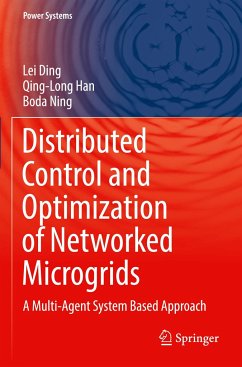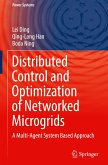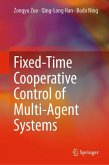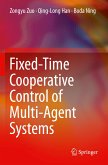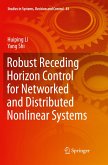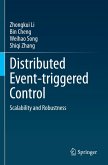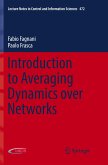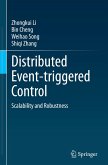Lei Ding, Qing-Long Han, Boda Ning
Distributed Control and Optimization of Networked Microgrids
A Multi-Agent System Based Approach
Lei Ding, Qing-Long Han, Boda Ning
Distributed Control and Optimization of Networked Microgrids
A Multi-Agent System Based Approach
- Broschiertes Buch
- Merkliste
- Auf die Merkliste
- Bewerten Bewerten
- Teilen
- Produkt teilen
- Produkterinnerung
- Produkterinnerung
This book presents new techniques and methods for distributed control and optimization of networked microgrids.
Distributed consensus issues under network-based and event-triggered mechanisms are first addressed in a multi-agent system framework, which can explicitly characterize the relationship between communication resources and the control performance. Then, considering the effects of network uncertainties, multi-agent system-based distributed schemes are tailored to solve the fundamental issues of networked microgrids such as distributed frequency regulation, voltage regulation, active…mehr
Andere Kunden interessierten sich auch für
![Distributed Control and Optimization of Networked Microgrids Distributed Control and Optimization of Networked Microgrids]() Lei DingDistributed Control and Optimization of Networked Microgrids97,99 €
Lei DingDistributed Control and Optimization of Networked Microgrids97,99 €![Fixed-Time Cooperative Control of Multi-Agent Systems Fixed-Time Cooperative Control of Multi-Agent Systems]() Zongyu ZuoFixed-Time Cooperative Control of Multi-Agent Systems90,99 €
Zongyu ZuoFixed-Time Cooperative Control of Multi-Agent Systems90,99 €![Fixed-Time Cooperative Control of Multi-Agent Systems Fixed-Time Cooperative Control of Multi-Agent Systems]() Zongyu ZuoFixed-Time Cooperative Control of Multi-Agent Systems90,99 €
Zongyu ZuoFixed-Time Cooperative Control of Multi-Agent Systems90,99 €![Robust Receding Horizon Control for Networked and Distributed Nonlinear Systems Robust Receding Horizon Control for Networked and Distributed Nonlinear Systems]() Huiping LiRobust Receding Horizon Control for Networked and Distributed Nonlinear Systems75,99 €
Huiping LiRobust Receding Horizon Control for Networked and Distributed Nonlinear Systems75,99 €![Distributed Event-triggered Control Distributed Event-triggered Control]() Zhongkui LiDistributed Event-triggered Control104,99 €
Zhongkui LiDistributed Event-triggered Control104,99 €![Introduction to Averaging Dynamics over Networks Introduction to Averaging Dynamics over Networks]() Fabio FagnaniIntroduction to Averaging Dynamics over Networks82,99 €
Fabio FagnaniIntroduction to Averaging Dynamics over Networks82,99 €![Distributed Event-triggered Control Distributed Event-triggered Control]() Zhongkui LiDistributed Event-triggered Control104,99 €
Zhongkui LiDistributed Event-triggered Control104,99 €-
-
-
This book presents new techniques and methods for distributed control and optimization of networked microgrids.
Distributed consensus issues under network-based and event-triggered mechanisms are first addressed in a multi-agent system framework, which can explicitly characterize the relationship between communication resources and the control performance. Then, considering the effects of network uncertainties, multi-agent system-based distributed schemes are tailored to solve the fundamental issues of networked microgrids such as distributed frequency regulation, voltage regulation, active power sharing/load sharing, and energy management.
The monograph will contribute to stimulating extensive interest of researchers in electrical and control fields.
Distributed consensus issues under network-based and event-triggered mechanisms are first addressed in a multi-agent system framework, which can explicitly characterize the relationship between communication resources and the control performance. Then, considering the effects of network uncertainties, multi-agent system-based distributed schemes are tailored to solve the fundamental issues of networked microgrids such as distributed frequency regulation, voltage regulation, active power sharing/load sharing, and energy management.
The monograph will contribute to stimulating extensive interest of researchers in electrical and control fields.
Produktdetails
- Produktdetails
- Power Systems
- Verlag: National Natural Science Foundation of China / Natural Science Foundation of Jiangsu / Springer / Sp
- Artikelnr. des Verlages: 978-3-030-95031-6
- 1st edition 2022
- Seitenzahl: 176
- Erscheinungstermin: 11. Februar 2023
- Englisch
- Abmessung: 235mm x 155mm x 10mm
- Gewicht: 277g
- ISBN-13: 9783030950316
- ISBN-10: 303095031X
- Artikelnr.: 67288474
- Herstellerkennzeichnung
- Springer-Verlag GmbH
- Tiergartenstr. 17
- 69121 Heidelberg
- ProductSafety@springernature.com
- Power Systems
- Verlag: National Natural Science Foundation of China / Natural Science Foundation of Jiangsu / Springer / Sp
- Artikelnr. des Verlages: 978-3-030-95031-6
- 1st edition 2022
- Seitenzahl: 176
- Erscheinungstermin: 11. Februar 2023
- Englisch
- Abmessung: 235mm x 155mm x 10mm
- Gewicht: 277g
- ISBN-13: 9783030950316
- ISBN-10: 303095031X
- Artikelnr.: 67288474
- Herstellerkennzeichnung
- Springer-Verlag GmbH
- Tiergartenstr. 17
- 69121 Heidelberg
- ProductSafety@springernature.com
Professor Lei Ding received the B.Sc. degree in Automation, and the M.Sc. and Ph.D. degrees in Control Theory and Control Engineering from the Dalian Maritime University, Dalian, China, in 2007, 2009, and 2014, respectively. From 2010 to 2012, he was a Visiting Ph.D. Student sponsored by China Scholarship Council at the Centre for Intelligent and Networked Systems, Central Queensland University, Australia. From 2015 to 2016, he was a Visiting Research Fellow at Western Sydney University, Australia. From 2016 to 2017, he was a Postdoctoral Associate at Wayne State University, USA. From 2017 to 2019, he worked as a Research Fellow at Swinburne University of Technology, Australia. He is currently a Full Professor at the Nanjing University of Posts and Telecommunications Nanjing, China. Professor Ding was the recipient of The 2021 IEEE/CAA Journal of Automatica Sinica Norbert Wiener Review Award, The 2020 IEEE Transactions on Industrial Informatics Outstanding Paper Award, and The 2019 IEEE SMC Society Andrew P. Sage Best Transactions Paper Award. He was awarded as Jiangsu Specially appointed Professor by Jiangsu Education Department, China, and the Dingxin Scholar by Nanjing University of Posts and Telecommunications, China. He is an Early Career Advisory Board Member of Control Engineering Practice and IEEE/CAA Journal of Automatica Sinica. He served as a Guest Editor of Control Engineering Practice and IEEE Transactions on System, Man, and Cybernetics: Systems, and Information Sciences. He is the Senior Member of IEEE. Professor Qing-Long Han is Pro Vice-Chancellor (Research Quality) and a Distinguished Professor at Swinburne University of Technology, Melbourne, Australia. He held various academic and management positions at Griffith University and Central Queensland University, Australia. He received the Ph.D. degree in Control Engineering from East China University of Science and Technology in 1997. His research interests include networked control systems, multi-agent systems, time-delay systems, smart grids, unmanned surface vehicles, and neural networks. Professor Han was the recipient of The 2021 Norbert Wiener Award (the Highest Award in systems science and engineering, and cybernetics), The 2021 M. A. Sargent Medal (the Highest Award of the Electrical College Board of Engineers Australia), The 2021 IEEE/CAA Journal of Automatica Sinica Norbert Wiener Review Award, The 2020 IEEE Systems, Man, and Cybernetics (SMC) Society Andrew P. Sage Best Transactions Paper Award, The 2020 IEEE Transactions on Industrial Informatics Outstanding Paper Award, and The 2019 IEEE SMC Society Andrew P. Sage Best Transactions Paper Award. Professor Han is a Member of the Academia Europaea (The Academy of Europe). He is a Fellow of The Institute of Electrical and Electronic Engineers (IEEE) and a Fellow of The Institution of Engineers Australia. He is a Highly Cited Researcher in both Engineering and Computer Science (Clarivate Analytics). He has served as an AdCom Member of IEEE Industrial Electronics Society (IES), a Member of IEEE IES Fellow Committee, and Chair of IEEE IES Technical Committee on Networked Control Systems. He is Co-Editor-in-Chief of IEEE TRANSACTIONS ON INDUSTRIAL INFORMATICS, Deputy Editor-in-Chief of IEEE/CAA JOURNAL OF AUTOMATICA SINICA, Co-Editor of Australian Journal of Electrical and Electronic Engineering, an Associate Editor for 12 international journals, including the IEEE TRANSACTIONS ON CYBERNETICS, IEEE INDUSTRIAL ELECTRONICS MAGAZINE, Control Engineering Practice, and Information Sciences, and a Guest Editor for 13 Special Issues. Dr. Boda Ning received the B.Eng. degree in automatic control from East China University of Science and Technology, Shanghai, China, in 2011, the M.Sc. degree with Distinction in control systems from University of Manchester, Manchester, U.K., in 2012, and the Ph.D. degree in electrical and electronic engineering from Swinburne University of Technology, Melbourne, VIC, Australia, in 2017. Dr. Ning is a Senior Research Engineer at Swinburne University of Technology, where he was a Research Fellow from September 2017 to March 2019. From April 2019 to December 2019, he was a Research Fellow at RMIT University, Melbourne, VIC, Australia. From 2010 to 2011, he was an exchange student with University of Dundee, Dundee, U.K. His current research interests include cooperative control of multi-agent systems and automation in construction.
Chapter 1. Introduction.- Chapter 2. Network-Based Consensus of Multi-Agent Systems.- Chapter 3. Sampled-Data-Based Event-Triggered Consensus of Multi-Agent Systems.- Chapter 4. Distributed Event-triggered Secondary Control for Islanded Microgrids.- Chapter 5. Distributed Finite-Time Secondary Control for Islanded Microgrids.- Chapter 6. Distributed Resilient Finite-Time Secondary Control for Heterogeneous BESSs.- Chapter 7. Distributed Optimal Control of DC Microgrids with Communication Delays.- Chapter 8. ibuted Energy Management for Smart Grids.- Index.
Chapter 1. Introduction.- Chapter 2. Network-Based Consensus of Multi-Agent Systems.- Chapter 3. Sampled-Data-Based Event-Triggered Consensus of Multi-Agent Systems.- Chapter 4. Distributed Event-triggered Secondary Control for Islanded Microgrids.- Chapter 5. Distributed Finite-Time Secondary Control for Islanded Microgrids.- Chapter 6. Distributed Resilient Finite-Time Secondary Control for Heterogeneous BESSs.- Chapter 7. Distributed Optimal Control of DC Microgrids with Communication Delays.- Chapter 8. ibuted Energy Management for Smart Grids.- Index.

